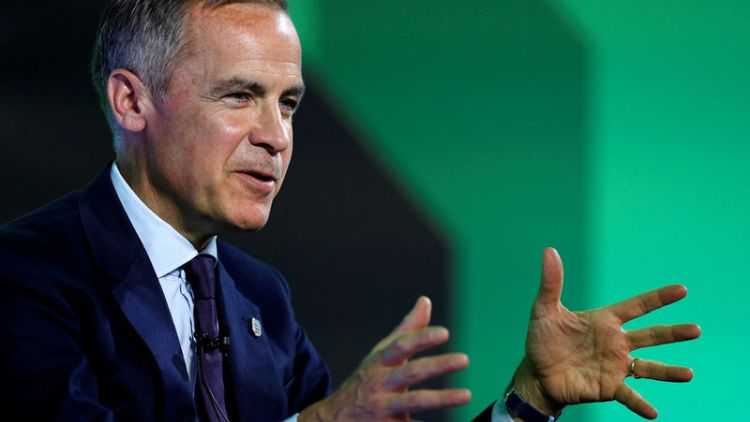By William Schomberg
LONDON (Reuters) - The Bank of England looks set to pass a post-financial crisis milestone next week by finally raising interest rates above their emergency levels set more than nine years ago.
But with a potentially messy Brexit nearing, Governor Mark Carney may sound cautious about the pace of further moves away from the BoE's still-powerful stimulus programme.
In March 2009, when the financial crisis was raging, the BoE slashed its benchmark rate to 0.5 percent to stave off the risk of a depression.
Bank Rate has sat there since, apart from a 15-month period after the shock referendum vote in 2016 for Britain to leave the European Union, when it was cut again to 0.25 percent - the lowest in the three-century history of the central bank.
Now, Carney and his colleagues are expected to nudge rates up to 0.75 percent on Aug. 2, going beyond last November's increase back up to 0.5 percent.
However, taking rates above their crisis levels will not be a vote of confidence in the world's fifth-biggest economy.
Britain has gone from having the strongest growth of the Group of Seven rich nations to being one of the slowest after the Brexit decision.
The terms of Britain's future relationship with the EU are still unclear, eight months before Brexit, and Prime Minister Theresa May could yet be unseated by her own Conservative Party which is split on how close the country should remain to the bloc.
At the same time, consumers are still feeling a squeeze on their spending power. And inflation, while above the BoE's 2 percent target at 2.4 percent, has been weaker than expected.
Nonetheless, the BoE says the economy cannot grow even at its current sluggish rate without causing too much inflation, given Britain's chronically weak productivity growth.
A BoE decision to raise borrowing costs could also be backed up by a new estimate of what it considers the neutral interest rate for Britain's economy, which neither stimulates nor suppresses demand and which is likely to be rising in the coming years as the effects of the financial crisis fade.
U-TURN AHEAD?
BoE officials have tried to soothe concerns about raising rates, something they promise will be gradual and limited.
"Voting for a 25 basis-point rate rise, a full decade after monetary policy was first placed on an emergency setting, is hardly either surprising or radical," Chief Economist Andy Haldane said in late June.
But some analysts believe raising borrowing costs is an unnecessary risk that the central bank is taking because it failed to deliver on previous signals that a hike was coming.
John Wraith, a strategist at UBS, said domestic inflation pressure -- chiefly from wage growth -- was very benign while tighter monetary conditions risked triggering a squeeze on indebted consumers and cooling domestic demand.
"If and when that happens, the interest rate market may start to anticipate a reversion by the (BoE) to a neutral policy stance, especially if there are ongoing headwinds and downside risks to the outlook emanating from the UK's protracted exit from the EU," he said in a note to clients, adding that investors might even start to bet on a rate cut ahead.
Yet the chance of an increase on Thursday is rated at 80 percent by financial markets, and eight of the BoE's nine monetary policymakers are likely to back a rise, analysts say.
Investors will be listening closely for whatever signals Carney gives about the outlook for further increases.
Markets are not pricing in an increase in borrowing costs to 1 percent for at least another year.
In the past, Carney has warned investors they are being too relaxed about the prospect of further hikes.
Victoria Clarke, an economist with Investec, said the BoE might want to send another reminder to the market to remain on guard, as long as Britain manages to secure a deal with the EU and avoid a damaging "cliff-edge" Brexit.
"We don't know what politics will bring but I think Carney would want to push those expectations up a bit," Clarke said.
(editing by David Stamp)



